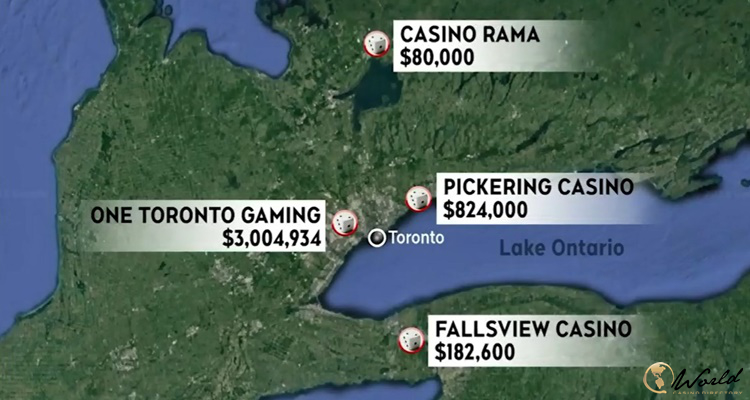Over the past year, over $350 million, 372 million dollars to be exact, in suspicious transactions have been discovered in Ontario casinos.
Furthermore, according to critics, this trend needs immediate attention if the region is to avoid linking dirty money to its casinos.
Continious reporting of suspicious transactions:
The high number of suspicious transaction reports underscores that casino staff are rigourous in reporting such transactions, according to provincial gambling officials. But, the NDP’s critic for the Attorney-General, Kristyn Wong-Tam, said: “The volume is a major concern.
“I think that amount is quite alarming. Clearly, more needs to be done and more needs to be done proactively.”
On a related note, according to freedom of information requests made by CTV News “$372 million in suspicious transactions were reported in Ontario casinos in 2022. The multi-million dollar figure follows years of pandemic lows but is still some $38 million higher than pre-pandemic levels.”
OPP’s investigation:
During an investigation by the Ontario Provincial Police (OPP), it was discovered through transactions disclosed in an affidavit that Branavan Kanapathipillai was responsible for over $4 million in casino buy-ins and withdrawals over several years.
Furthermore, his large cash buy-in at Pickering Casino Resort in July 2022 provoked casino staff to create suspicious cash transaction reports and notify authorities.
In this regard, officer in the affidavit wrote: “He made 10 transactions ranging from $50,000 to $100,000, totalling $824,700.
“The source of cash was unclear, and it was atypical for an individual to possess such a large amount of cash.” In addition, the report emhasizes that cash without a source shows that there is a high possibility of money laundering.
In this regard, the affidavit states: “But despite the red flags, the casino still accepted his cash, as did at least three other casinos since 2016.”
Furthermore, CTV News asked Pickering Casino and Resort to comment on why it accepted $824,700 in cash in July 2022 when it was “unclear” what the source of the funds was. However, it received no response.
Seizure of cash:
“The One Toronto Gaming Anti-Money Laundering Unit identified Kanapathipillai as having conducted suspicious transactions due to the discrepancy between his occupation and casino gaming activity, the spike in his gaming activity, and the high number of large cash transactions.
“From Oct. 30, 2021 to Sept. 14, 2022 at One Toronto Gaming sites, Kanapathipillai generated 48 large cash transaction reports totalling $1,529,700, 38 casino disbursement reports totalling $1,348,115, $79,800 in lower level cash to chip transactions, and $37,500 in lower-level chip-to-cash transactions,” according to the affidavit.
However, as luck would have it, Kanapathipillai slipped up when his try to buy in with almost $100,000 of cash at Niagara’s Fallsview Casino was thwarted when casino staff reported it to authorities, leading to the money being seized by the OPP.
To defend himself, Kanapathipillai told investigators that “he was gambling with the proceeds of a third mortgage.” However, he didn’t appear to formally reiterate that claim at a court hearing this week to decide whether the seizure will be permanent.
A system that tracks suspicious cash transactions shows results:
Commenting on the Kanapathipillai case, gambling officials in Ontario say: “The filing of the reports in Kanapathipillai’s case is a sign that the system put in place to monitor suspicious cash transactions is working and enabling law enforcement to follow the money.”
On that note, an AGCO spokeperson said: “We can confirm that this matter was the result of an investigation conducted by the OPP Investigation and Enforcement Bureau embedded within the Alcohol and Gaming Commission of Ontario (AGCO).
“The presence of an embedded police bureau that specializes in money laundering and related investigations is unique to Ontario, compared to other jurisdictions. The IEB works closely with the OLG’s Anti-Money Laundering Team to ensure casino reporting is monitored and information about suspected money laundering is identified and investigated.”
Furthermore, AGCO released new standards in 2022 that require casino operators to determine and certify a patron’s source of funds, according to the agency.
“Across Ontario, casino gaming sites are expected to generate $158 million for host communities,” according to the Ontario Lottery and Gaming business plan.
Reduction of suspicious cash transactions due to COVID-19:
Figures published by CTV News Toronto through a freedom of information request indicate that the total number of suspicious transactions fell from $334 million in 2019 to $134 million in 2020, because of the pandemic.
In 2021, the total number of suspicious transactions dropped even further, to $116 million. However, with the end of the pandemic and the reopening of casinos, the total amounts of suspicious transactions have risen to new heights.



